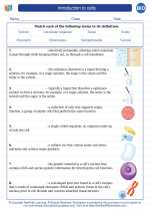Acids
Acids are a class of compounds that have specific chemical properties. They are defined as substances that donate protons (H+) in a chemical reaction. The strength of an acid is determined by its ability to donate protons. Acids can be found in various forms, including as solutions, solids, and gases.
Properties of Acids
Acids have several characteristic properties, including:
- Sour Taste: Many acids have a sour taste. However, it's important to note that tasting acids can be dangerous and should not be done without proper knowledge and safety precautions.
- pH Level: Acids have a pH level lower than 7. The lower the pH, the stronger the acid.
- Reactivity with Metals: Acids react with certain metals to produce hydrogen gas and a salt.
- Change in Color of Indicators: Acids can change the color of specific indicators, such as turning blue litmus paper red.
- Electrolyte Properties: Acids can conduct electricity when dissolved in water.
Common Acids
There are many different types of acids, each with its own unique properties and uses. Some common examples of acids include:
- Hydrochloric Acid (HCl): Found in the stomach and used in various industrial processes.
- Sulfuric Acid (H2SO4): Widely used in the production of fertilizers, chemicals, and in car batteries.
- Nitric Acid (HNO3): Used in the production of fertilizers, explosives, and various organic compounds.
- Acetic Acid (CH3COOH): Found in vinegar and used in the production of plastics and textiles.
- Carbonic Acid (H2CO3): Found in carbonated beverages and plays a role in the carbon cycle.
Acid-Base Reactions
Acids can undergo reactions with bases to form salts and water in a process known as neutralization. The general equation for an acid-base reaction is:
For example, the reaction between hydrochloric acid and sodium hydroxide can be represented as:
HCl + NaOH → NaCl + H2O
Acid Rain
Acid rain is a type of environmental pollution caused by the release of sulfur dioxide and nitrogen oxides into the atmosphere, which react with water vapor to form sulfuric acid and nitric acid. Acid rain can have detrimental effects on the environment, including damaging plant life, aquatic ecosystems, and infrastructure.
Study Guide
When studying acids, it's important to focus on the following key points:
- Understanding the definition and properties of acids, including pH level, reactivity, and electrolyte properties.
- Being able to identify common acids and their uses in various industrial and everyday applications.
- Understanding acid-base reactions and being able to write balanced chemical equations for neutralization reactions.
- Exploring the environmental impact of acid rain and its effects on ecosystems.
Additionally, practicing with acid-base calculations and conducting experiments to observe the properties and reactions of acids can further enhance your understanding of this topic.
Remember to always handle acids with caution and follow proper safety guidelines when conducting experiments or working with acidic substances.
[Acids] Related Worksheets and Study Guides:
.◂Biology Worksheets and Study Guides High School. Introduction to cells
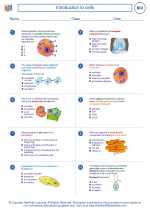
 Worksheet/Answer key
Worksheet/Answer key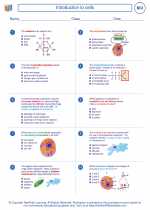
 Worksheet/Answer key
Worksheet/Answer key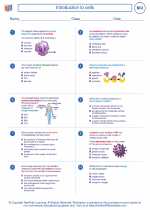
 Vocabulary/Answer key
Vocabulary/Answer key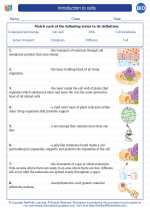
 Vocabulary/Answer key
Vocabulary/Answer key
 Vocabulary/Answer key
Vocabulary/Answer key
 Vocabulary/Answer key
Vocabulary/Answer key